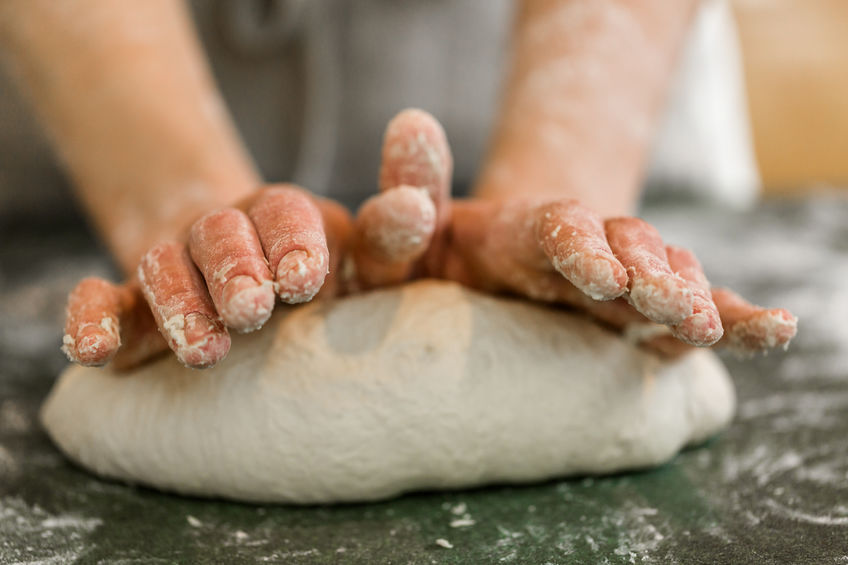By Jessica Scarpati –
As society retreated into lockdown earlier this year, anxious and homebound people worldwide seemed to simultaneously experience the same primitive instinct: I should bake bread. Subsequently, packaged yeast soon disappeared from grocery shelves and homemade sourdough took the world by storm.
Social media feeds became overrun with photos of bubbly sourdough starter—a slurry of water and flour that cultivates a colony of naturally occurring, or “wild,” yeast and beneficial bacteria that give sourdough its characteristic tangy flavor. Affectionately shown off like pets or babies, they were christened with names like Clint Yeastwood, Breaddie Mercury and Vincent Van Dough. Google searches for “sourdough” hit an all-time high in April. King Arthur Flour’s baking hotline struggled to keep up with an unprecedented volume of callers. Even celebrities heeded sourdough’s siren call. During an interview from his home this spring, actor and newly converted sourdough baker Jake Gyllenhaal earnestly shushed Late Show host Stephen Colbert lest their boisterous conversation disturb his resting dough.
Sourdough mania has since subsided, but the mind and body benefits of baking (and eating) sourdough bread never go stale. And with Sourdough September upon us, there’s no better moment for first-time bread bakers to start loafing around.
Baking your own bread is often healthier than consuming packaged bread. Home bakers have total control over what goes into the finished product—typically just flour, water, yeast and salt—and aren’t at the mercy of industrial-grade practices that rely on emulsifiers, preservatives, high-fructose corn syrup or excess sodium to keep products shelf-stable or inexpensive.
But dietary benefits aside, it’s also not surprising bread baking has experienced its recent resurgence, according to behavioral health experts, who say it provides a welcome sense of purpose, accomplishment and structure during a wildly uncertain time in the world.
“In these times, all of us are experiencing a strongly reduced sense of control over our lives,” consumer psychologist Kate Nightingale told Stylist magazine. “Self-reliance is a manifestation of control, and therefore helps us to meet one of those truly basic human needs: safety. Baking bread is the ultimate act of self-reliance. The independence the act of baking bread delivers is unparalleled to many other manifestations of control right now.”
One study found that baking bread helped people build confidence, learn to cope with challenges better, increase their concentration and improve coordination.
“With baking bread there’s a lot of physicality, and the kneading of the dough and getting it into the right shape can help you relieve some tension,” study author and occupational therapy researcher Elizabeth McKay told CNN.
All forms of baking require patience and precision, and sourdough is no exception. It’s often described as a stubbornly slow and fickle process, with sourdough starters taking days or sometimes weeks to become ready for use in baking.
Sourdough’s fermentation time can be longer and more unpredictable than other breads, ranging anywhere from six to 24 hours, depending on the conditions in which the dough rises. Pop it in the oven too early or too late, and the result will be a disappointing discus rather than a springy boule.
In many ways, it is the ultimate exercise in mindfulness, says Mina Bressler, a marriage and family therapist (and home baker).
“There is a constant return to the moment. You need to focus on each step,” Bressler said in an interview with the San Francisco Chronicle. “You can’t jump several steps ahead—you have to let the process happen and trust that it will work.”
For many bakers, sourdough’s unpredictable nature is part of the excitement, as the ever-changing colony of microorganisms in sourdough starters mean no two loaves are ever alike in flavor.
“Where conventional breads rely on a single species of baker’s yeast—the microbial equivalent of a cattle ranch—sourdough is more like the Serengeti, a diverse ecosystem of interacting yeasts and bacteria,” explains Scientific American. “The nature of that ecosystem, and hence the flavor of the bread, is a profound expression of a particular time and place.”
In fact, sourdough’s defining traits—microbial diversity and slow fermentation—are thought to make sourdough bread easier to digest and give it a nutritional leg up on other bread-making techniques.
One study concluded that sourdough, when compared to bread produced with commercial yeast, was less likely to cause symptoms such as bloating and discomfort in people with irritable bowel syndrome or gluten sensitivities. Another found that sourdough led to better absorption of minerals in whole wheat flour—especially magnesium, iron and zinc—versus bread made with packaged yeast. Sourdough bread has cause fewer blood sugar spikes, making it a smarter choice for people trying to control their blood glucose level.
To be clear, sourdough is still bread, and nutritional experts say it should be consumed in moderation. But are far as carbs go, its benefits are fully baked.











